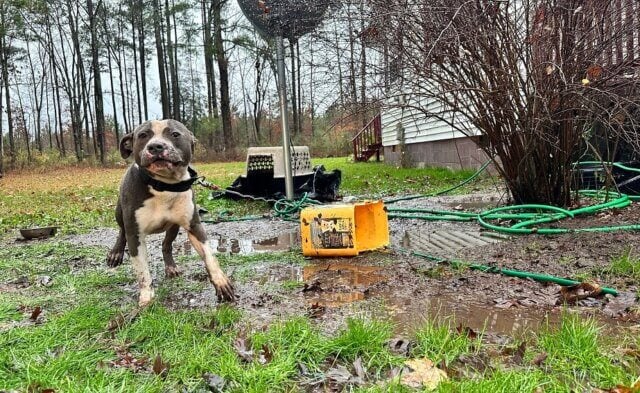Our canine family members are surprisingly fluent in our language. Just watch how your dog responds to the words “cookie,” “walk,” “bath,” and “vet”!
But how well do we understand theirs? In her book Let’s Have a Dog Party!, PETA President Ingrid E. Newkirk quotes dog expert Jayn Meinhardt:
“We expect dogs to understand our language, yet we fancy ourselves the more intelligent ones and cannot understand theirs. We all need to be more attuned to these wondrous, intelligent beings and their needs as they have to try so hard to fit into our world and we have too often not given them the world that they deserve.”
Whether you are a seasoned dog guardian or are caring for your first canine companion, take this quiz to find out what your best friend is trying to tell you. You might be quite surprised!
1. The talk show you’re watching on TV has just gotten to the good part when Rover starts whining at the door. What do you do?
a. Hop up and let Rover out. You’ll catch a re-run of the show someday.
b. Ignore Rover until the next commercial, then let him out. Getting up now just rewards him for whining, which you are trying to teach him to stop doing anyway.
c. Tell Rover, “No!” He needs to learn that he can’t go in and out every five minutes.
Answer: a. Rover is very politely telling you that he needs to go outside. (So what if he just went out five minutes ago? He obviously forgot to do something important!) If you absolutely cannot let Rover out right away, at least acknowledge him: “I hear you, buddy—I’m coming.”
2. Maggie is a confirmed “chow hound.” Every night at dinner, she hovers at your chair, drools on your knee, and tries to “steal” food off the table. What should you do?
a. Slip her some tidbits every few minutes.
b. Never give her scraps—this only encourages her and makes her want “people” food instead of dog chow.
c. Tell her to lie down and stay until dinner is over, then reward her with scraps.
d. None of the above.
Answer: c. Go ahead and give poor Maggie some variety in her life and feed her nutritious table scraps (but never chocolate, onions, grapes, or these other foods. Or, for a special treat, whip up one of the especially-for-dogs recipes in Let’s Have a Dog Party!—like lentil stew, “any occasion cake,” or molasses oat biscotti! Just make sure you feed her at the right time. First, always feed Maggie her dinner before yours. If she still comes begging, ask her to lie down and stay. Slipping Maggie morsels during dinner teaches her to beg, unfairly setting her up for scolding.
3. Fido knocks the wind out of everybody he meets with an enthusiastic pair of paws planted firmly on the chest. How can you stop him from jumping?
a. Step on Fido’s back feet so he learns to associate jumping up with discomfort.
b. Give visitors food treats, and instruct them to tell Fido to sit when he greets them.
c. Put your knee up as Fido jumps so that he hits the knee instead of you.
d. None of the above.
Answer: b. Fido is jumping on people because he is happy to see them. Do you really want him to associate being friendly with pain? Instead, ask him to express his greeting in a different way, such as sitting.
4. Princess is busy chewing on a tasty sofa cushion. You walk into the room and wail, “Princess!” She looks up, drops the cushion, and bounds over to you, joyfully wagging her tail. What do you do?
a. Tell her she’s a bad dog and give her a stern lecture on the high cost of sofa cushions.
b. Turn around and ignore her.
c. Bite your tongue and give her a pat and a hug.
Answer: c. This is perhaps the most important rule you can learn about communicating with your dog: Never, ever, ever scold a dog who comes to you willingly. Coming to you should always be a thrilling experience; scold her and she learns not to stop chewing cushions but that coming to you isn’t always such a great idea. If you catch her in the act of chewing before she comes to you, say, “Princess, leave it!” so that she leaves the cushions and you can then direct her to a more acceptable toy.
5. Benji barks at everything—the moon, the sun, dogs, cats, squirrels, cockroaches, dust mites. How can you get him to quit that incessant yapping?
a. Give Benji a biscuit to distract him.
b. Sneak up behind Benji and startle him with a swat on the rump as you yell, “No!”
c. Get one of those electronic collars that zaps Benji whenever he utters a peep.
d. None of the above.
Answer: d. Benji is barking because he’s trying to tell you something—”Look out, here comes that guy in the noisy truck!” or “Hey, I’m lonely out here by myself.”
But what if you’re not feeling particularly interested in what Benji has to say about the trash truck at 7 a.m.? Ask Benji to do something else! Start making 7 a.m. on trash day practice-lying-down-for-a-treat time until Benji gets the idea that lying down is the thing to do when the garbage truck comes.
6. While you were at work, Fluffy emptied the trash can on the living room floor. What should you do when you get home?
a. Bring Fluffy over to the mess, rub her nose in it, and tell her, “Bad dog!”
b. Lock Fluffy in the garage every day until she learns her lesson.
c. Act like Fluffy’s mess is no big deal, and figure out where to put the trash can so that she can’t get into it.
Answer: c. Corrections work only as a warning immediately beforehand (“Na-aah-aah, don’t even think of touching that trash can!”) or while Fluffy is “in the act.” If you wait until hours later, Fluffy will think she’s being scolded for what she’s doing right now, such as being happy to see you!
Your best bet is to stash the trash in a pantry or a “kid-safe” cabinet. Make sure Fluffy has a variety of toys (and/or companions) to keep her occupied and that she gets plenty of exercise, particularly in the morning. For fun ways to get your pup’s heart—and brain—racing, see the chapter “Let’s Play! Party Games Dogs Love That Only Need Two” in Let’s Have a Dog Party!
How’d You Score?
Give yourself a point for each correct answer.
0-2: Dog is definitely not your language! Take immediate action and learn more about canine communication. Also, why not throw your dog a party to make up for all the times you’ve messed up? Your dog will thank you for it.
3-4: You’re not quite fluent in “dog-ese” yet, but you’re getting there. Brush up on your communication skills by reading a book like Dogs Behaving Badly by Dr. Nicholas Dodman or Don’t Shoot the Dog by Karen Pryor, and sign yourself up for a useful training class.
5-6: Gandhi would be proud! Now go spend some quality time with that lucky pooch of yours!





